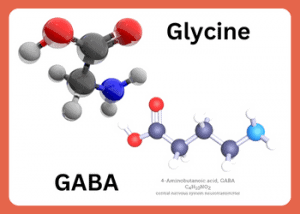Glycine and GABA are chemical messengers that have a vital responsibility in the brain and nervous system.
Glycine is an essential amino acid that promotes relaxation, stimulates collagen production, and helps maintain muscle mass. GABA, in contrast to glycine, plays a role as an inhibitory neurotransmitter by reducing overstimulation of the brain; this leads to feelings of tranquility and decreases anxiety.
Learn more about amino acids GABA and glycine neurotransmitter supplements, as this article discusses their roles in the human body. It also examines the potential advantages of taking supplements with these molecules, any side effects that could arise from supplementation, and the proper dosages to take for optimal results.
Moreover, the article covers a great deal of ground and delves deep into scientific research about them to present findings from recent studies. These include results around effects on sleep, anxiety levels, stress management measures, as well as cognitive function.
This article offers a comprehensive overview of the necessity of glycine and GABA in the body, their potential advantages, and ongoing research into these amino acids. A thorough understanding is provided to readers so they are equipped with all the pertinent information.
Table of Contents
What is Glycine?
| Topic | Description |
|---|---|
| Definition | Glycine is a non-essential amino acid as the body can produce it independently. This simplest of all amino acids plays an important role in constructing proteins, nucleic acids, and other critical molecules within our bodies. |
| Function | It is an essential element for our bodies as it acts as a neurotransmitter in the central nervous system, assists with immune regulation, and encourages collagen production. It’s also involved in heme formation – which helps hemoglobin to be efficiently produced – plus keeps other amino acid levels balanced throughout the body. |
| Benefits of supplementing | Supplementing with glycine has a variety of potential advantages, from improving sleep quality and reducing inflammation to assisting individuals dealing with schizophrenia, bipolar disorder, or metabolic disorders. Glycine may also help promote healthy skin, hair, and nails. |
| Recommended daily dosage | Depending on your individual factors such as age, gender, weight, and overall health status, the suggested daily dosage of glycine may vary. In general, terms though it is considered safe to consume between 3-5 grams each day; some research suggests that doses exceeding this amount could be beneficial for targeting certain conditions. It’s important to speak with a healthcare provider before considering taking any glycemic supplements – especially if you have underlying medical issues or are already taking medications. |
| Scientific research | An increasing number of studies are emerging to examine the possible health advantages linked with glycine supplementation. Reports suggest that glycine could be beneficial in contributing to improved sleep quality and alleviating symptoms of certain mental illnesses, while also offering anti-inflammatory and antioxidant qualities. However, further research is required to comprehend the full effects of glycine on human well-being along with an optimal dosage for specific conditions. |
What is GABA?
| Topic | Description |
|---|---|
| Definition | Gamma-aminobutyric acid (GABA) is a neurotransmitter produced in the brain, synthesized from glutamate. Its presence extends across both the central and peripheral nervous systems, allowing it to regulate neural activity by inhibiting excitatory signals. |
| Function | GABA is a key component in managing the excitability of neurons throughout our nervous system. It does so by decreasing neuron activity and limiting neurotransmitter release which often activates the nerves. Additionally, it supports muscle tone consistency as well as helps maintain proper functioning in both the endocrine and immune systems. |
| Benefits of supplementing | Incorporating GABA into your diet has an array of potential advantages, from alleviating anxiety to enhancing relaxation and sleep quality. It could even boost one’s mood or reduce premenstrual syndrome symptoms! Further research is necessary to confirm its effectiveness in managing epilepsy, Parkinson’s disease, and Huntington’s disease as well. |
| Recommended daily dosage | There is no official recommended daily dosage for GABA. However, most studies use doses ranging from 250 mg to 750 mg per day, typically divided into two or three doses. It is important to follow the manufacturer’s instructions for the specific product being used. |
| Scientific research | Recent evidence has suggested that GABA supplementation may be beneficial in reducing symptoms of anxiety, sleep disturbances, and stress. An investigation published by the Journal of Alternative and Complementary Medicine concluded that those who took a daily supplement experienced considerable improvement compared to individuals taking a placebo. An interesting study by Sleep Medicine observed that supplementation improved sleep quality and shortened the time it took for individuals with insomnia to fall asleep. Although more research is required in order to fully understand how supplements affect various health conditions, these findings point towards promising results. |
Glycine vs Gaba
Structurally similar and functioning as neurotransmitters within the central nervous system, Glycine and GABA (gamma-aminobutyric acid) have several important distinctions that are worth noting.
Chemical Structure:
Glycine is the most elementary amino acid, featuring a mere hydrogen atom in its side chain. Contrastingly, GABA’s longer structure has an additional carboxylic acid group and amino group – making it an altered variant of glutamate.
Function:
 Glycine is mainly an inhibitory neurotransmitter in the spinal cord and brainstem, where it plays a vital role in controlling muscle movements as well as sensory processing.
Glycine is mainly an inhibitory neurotransmitter in the spinal cord and brainstem, where it plays a vital role in controlling muscle movements as well as sensory processing.
Through its interaction with NMDA receptors involved in pain detection, glycine can act as either an agonist or co-agonist for glutamate release.
Additionally, glycine frequently acts on other neurotransmitter receptors to modulate activity throughout the nervous system.
In contrast, GABA is the most significant inhibitory neurotransmitter in your brain. When it interacts with its wide-reaching receptors throughout your brain, it has a calming result and can suppress neural activity.
This helps to keep an equilibrium between stimulatory and inhibiting signals in the mind which are vital for managing sleep patterns, stress levels, and other elements of behavior.
Synthesis:
The amino acid serine is converted to glycine via a set of chemical reactions that involve an enzyme known as serine hydroxymethyltransferase, while the transformation of glutamate into GABA requires the action of glutamic acid decarboxylase.
Receptors:
Glycine and GABA have various receptor sites that they act on. The ionotropic glycine receptor is a chloride channel, while the metabotropic glyRα1 receptor is G-protein coupled. Similarly, for GABA, its ionotropic receptors are also chlorine channels and it acts on G-protein coupled metabotropic receptors as well.
Ultimately, both GABA and glycine supplements are vital neurotransmitters that control neuronal activity as well as behavior. Although they share various similarities such as structure and function, there are also marked distinctions between their synthesis, receptor types, and brain distribution.
How Do Glycine and GABA Work Together?
GABA is the leading inhibitory neurotransmitter in the brain, yet glycine also has an important role as a co-agonist for NMDA receptors that are associated with excitatory transmission.
Numerous investigations have explored the power of glycine and GABA in tandem to relax and soothe. An investigation published in the Journal of Sleep Research discovered that a mixture of glycine and GABA supplementation resulted in better sleep quality and decreased tiredness for those with sleeping issues. Furthermore, the synthesis was more beneficial than either supplement utilized singularly.
According to a recent study published in the Journal of Psychiatric Research, administering glycine and GABA together was found to be more effective at reducing anxiety symptoms among schizophrenia patients than either supplement taken separately. The combination proved much more successful than any single treatment alone.
How glycine and GABA together collaborate to produce a sense of ease and peacefulness is uncertain, though it’s likely associated with their regulation of the brain’s GABAergic system. It has been proposed that glycine behaves as an auxiliary coactivator for GABA receptors; in other words, it intensifies the binding between them while also amplifying its inhibitory abilities.
Overall, the evidence from scientific studies indicates that taking glycine and GABA together may be a useful way to promote relaxation, lower anxiety levels, and improve sleep. However, further research is necessary to uncover how these compounds work in the body and find out what doses are most effective for different people over various lengths of time.
Frequently Asked Questions
Is GABA and Glycine Same?
In comparison to GABA, which is used in almost all inhibitory synapses throughout the spinal cord, glycine is confined mostly to about half of these same neural pathways. This demonstrates that its distribution within the central nervous system is more localized than that of GABA.
Why is GABA and Glycine Inhibitory?
Since the equilibrium potential of chloride ions is usually more negative than what’s needed to create action potentials, they are known as major inhibitors of neurotransmission in adult central nervous systems.
Does Glycine Bind to GABA Receptors?
From a structural perspective, ionotropic GABA receptors are strikingly similar to the glycine receptor. Moreover, these receptors have made their mark in clinical medicine due to an overwhelming number of drugs that specifically bind to them.
Does Glycine Increase GABA?
Absolutely, glycine has been proven to increase GABA levels in the brain. Glycine is a powerful co-agonist of NMDA receptors and encourages the enhanced release of neurotransmitters.
What Neurotransmitters Does Glycine Affect?
Glycine primarily functions as an inhibitory neurotransmitter in the central nervous system, influencing neurotransmission through its action at specific receptors. The main neurotransmitter receptors affected by glycine are known as glycine receptors (GlyRs). Glycine receptors are ligand-gated ion channels found in the spinal cord and various regions of the brain.
Glycine acts as an agonist at these receptors, meaning that it binds to and activates them. When glycine binds to GlyRs, it typically results in an influx of chloride ions into the neuron, leading to membrane hyperpolarization. This hyperpolarization inhibits the generation of action potentials and decreases neuronal excitability, playing a crucial role in modulating neurotransmission.
Furthermore, glycine has an interplay with the neurotransmitter gamma-aminobutyric acid (GABA). Both glycine and GABA are inhibitory neurotransmitters, and they often work together to regulate neuronal activity. While GABA primarily acts through its receptors, glycine, as mentioned, exerts its inhibitory effects through GlyRs.
The combined action of glycine and GABA contributes to the overall balance of excitatory and inhibitory signals in the nervous system, essential for maintaining proper neuronal function and preventing excessive neuronal activity.
In summary, glycine predominantly affects neurotransmission through its interaction with glycine receptors, exerting inhibitory effects in the central nervous system. This modulation of neuronal activity contributes to the intricate balance of neurotransmitters and is crucial for the proper functioning of the nervous system.
Conclusion
Ultimately, both have crucial functions in the human body and nervous system. Glycine is a non-essential amino acid that assists with building proteins, molecules, and neurotransmitters for the central nervous system, immune regulation enhancement, and stimulating collagen production.
GABA is a neurotransmitter in the brain that curbs neural activity and controls neuron action throughout our system. Supplementing with both may offer potential advantages such as better sleeping patterns, diminished inflammation levels, and lesser anxiety-like symptoms.
Although more investigation is needed to fully comprehend how these molecules can improve our well-being and what ideal dosages are best for various issues or circumstances, they certainly hold great promise of supporting all-around healthiness.
